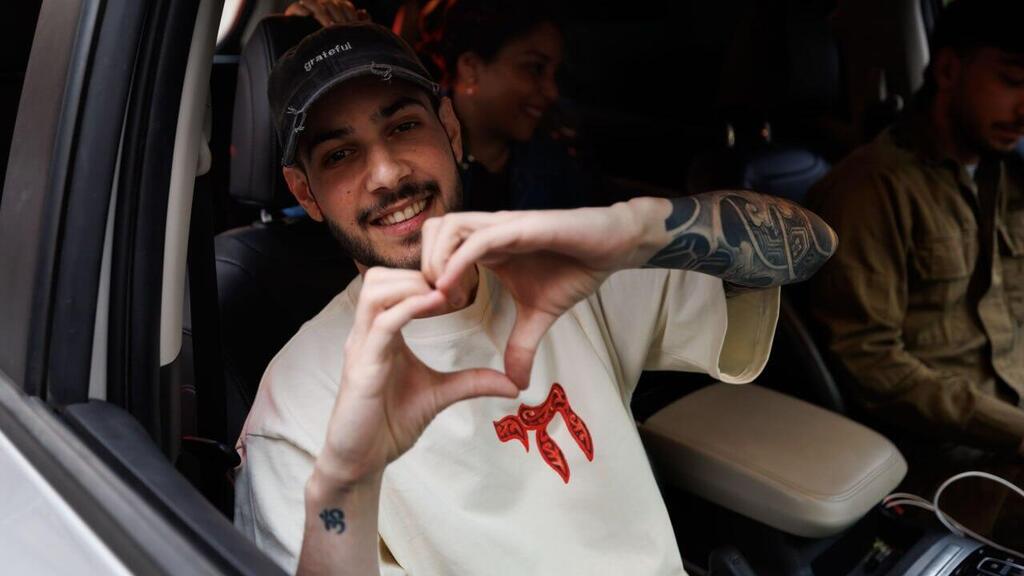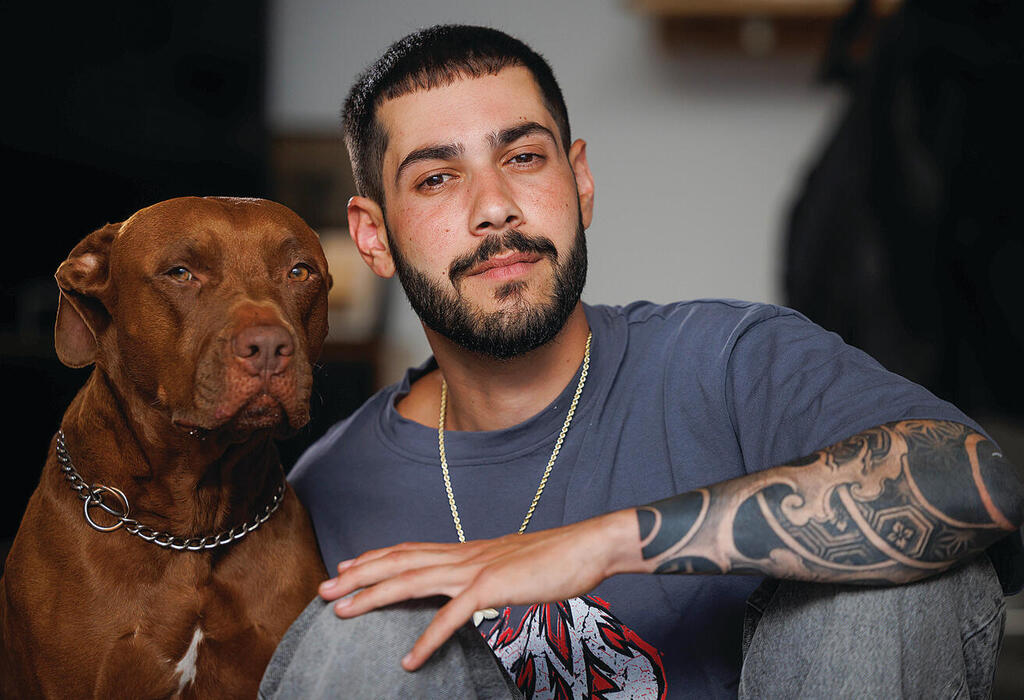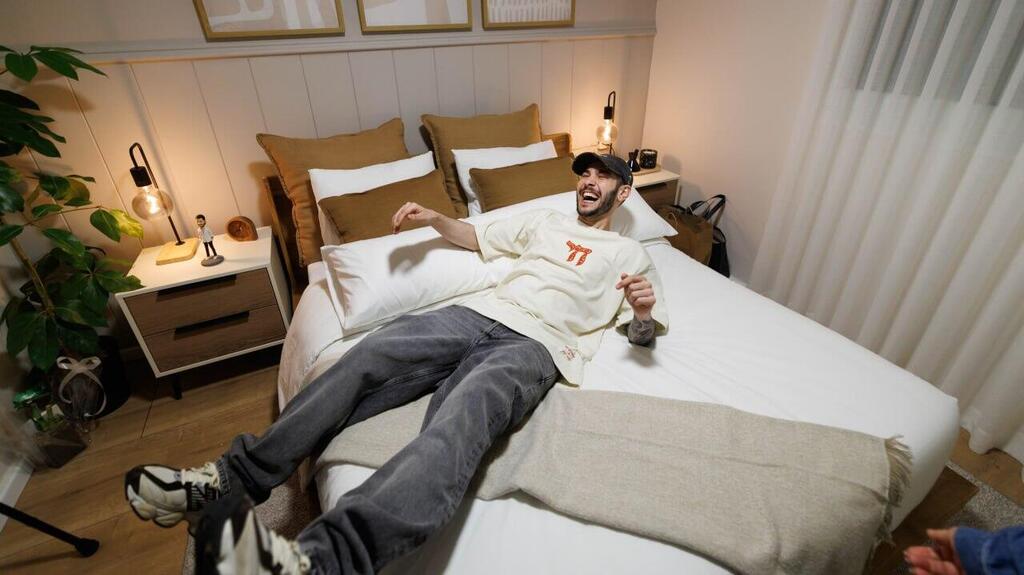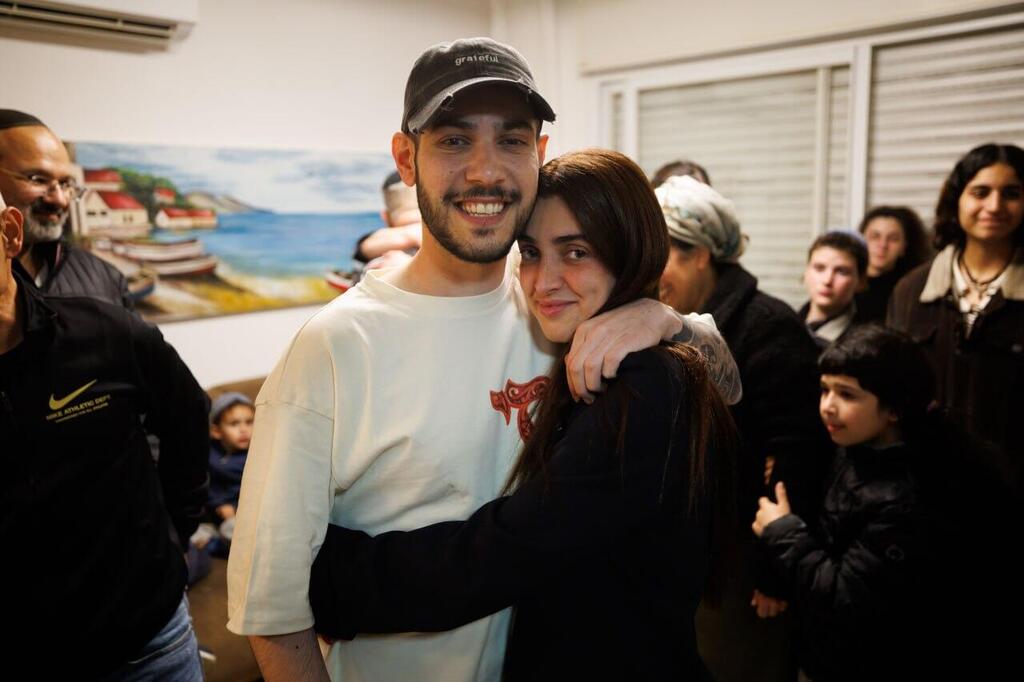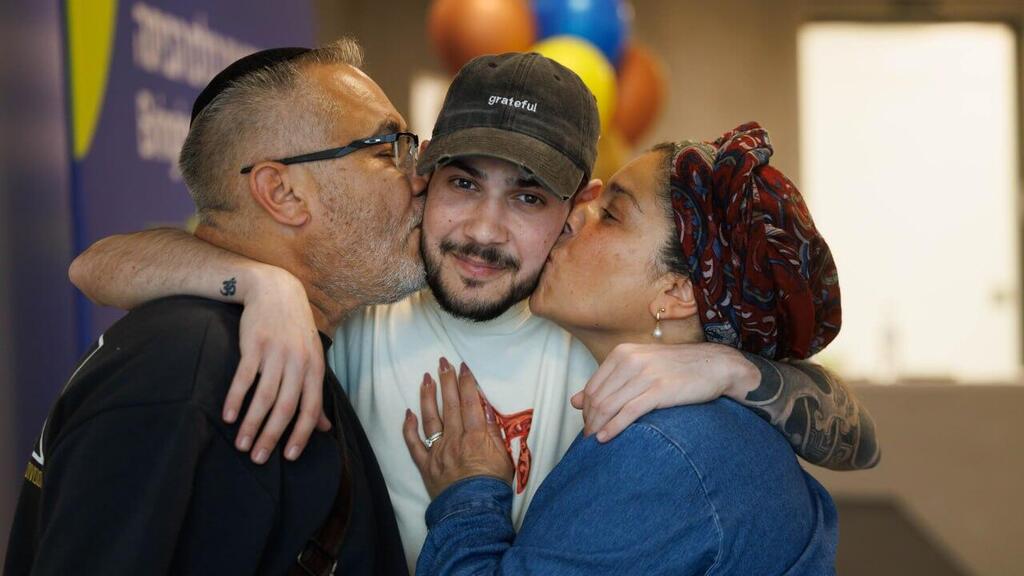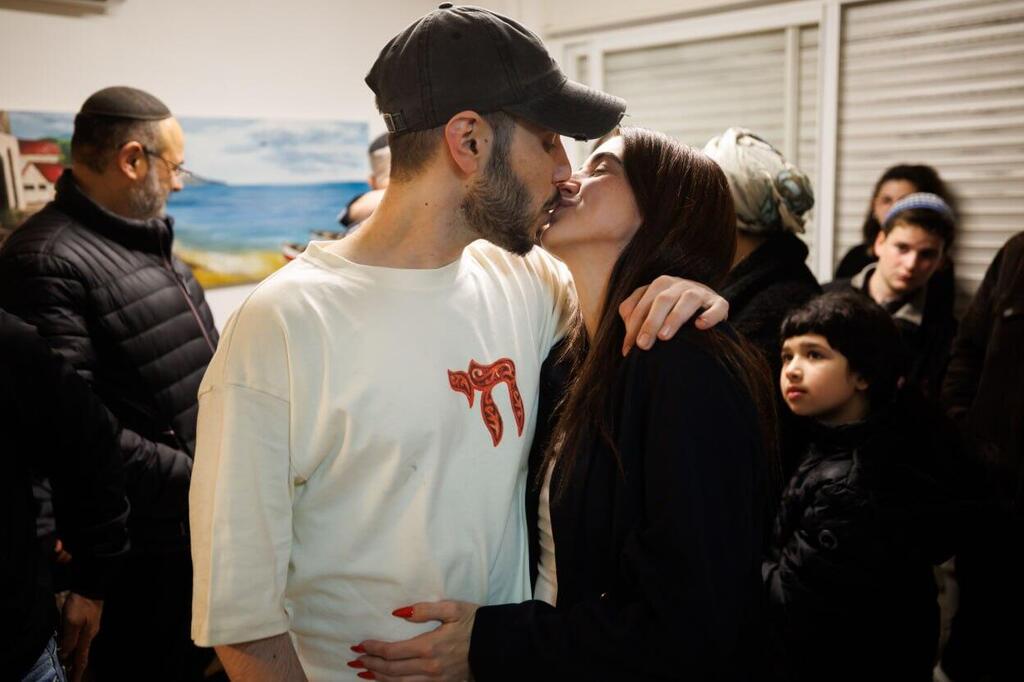Eliya Cohen will never forget the twisted smile on the face of the Hamas terrorist who stormed into the shelter of death to kidnap him to Gaza. “There were almost 30 of us in that tiny space, and dozens of grenades exploded inside,” he recalls. “Aner Shapira stood heroically at the entrance. I was buried under bodies. After he was hit, I realized nothing good would come of this. When the terrorists entered, I was sure they were going to execute us. I closed my eyes. When I opened them, one of them was holding out his hand to me.”
“They moved bodies to get to me,” he continues. “That terrorist’s smile is a moment I can’t forget. I don’t understand how a human being, with a body and a soul, can walk into that hell—people bleeding, bodies torn apart—and smile, and film it. What we went through that day will stay with me for life. In the beginning, I had terrible nightmares in captivity. I’d wake up in a panic, like I was being shot in the head. My body was in total trauma.”
So began Cohen’s 18-month ordeal of hunger, humiliation, fear and violence. His time in Gaza included airstrikes on the apartment where he was held, a failed escape attempt, and repeated moments when his captors aimed their rifles at him, ready to shoot if the IDF came near. Yet surrender was never an option. “Breaking wasn’t on the table,” he says.
“There were constant bombings, everything was shaking, shattering, collapsing. When the house lost its walls, they took us down into a tunnel through a mosque. From day one in Gaza, I kept wondering when we’d end up there. Once inside the tunnel, I felt slightly safer. At least there, I thought, I wouldn’t die from a missile.”
A smile of survival
Now, just over 70 days since his release from Hamas captivity, the young man who flashed a defiant victory sign to his captors on stage is forging a new path. He volunteers with children battling cancer, goes scuba diving, dreams of raising children with his fiancée Ziv Aboud, and is considering studying psychology. “The Eliya of today,” he says, “just wants to live.”
He’s still delaying treatment for the gunshot wound in his leg, a lingering injury from the shelter. “They pulled the bullet out with tweezers and sewing thread. Then they knocked us out with an injection,” he recalls. “Physically, I’m still injured and need surgeries, but I don’t want to be stuck in a hospital right now, so I’m putting it off. I have no shoulder ligaments, I dislocate it even in my sleep and pop it back myself. I also have knee issues and hearing loss.”
The day the bullet was removed, he says: “They told us the place was about to be bombed and rushed us to a basement. The entire house was destroyed. That was our first day in Gaza.”
An escape that almost was
One time, airstrikes gave him a chance to escape. “The guards panicked and abandoned us. I looked at the other hostages—I didn’t even know their names yet—and said, ‘Let’s run! Are you serious? We can do this.’ Call it instinct, a gut feeling. So we ran into the street.”
7 View gallery
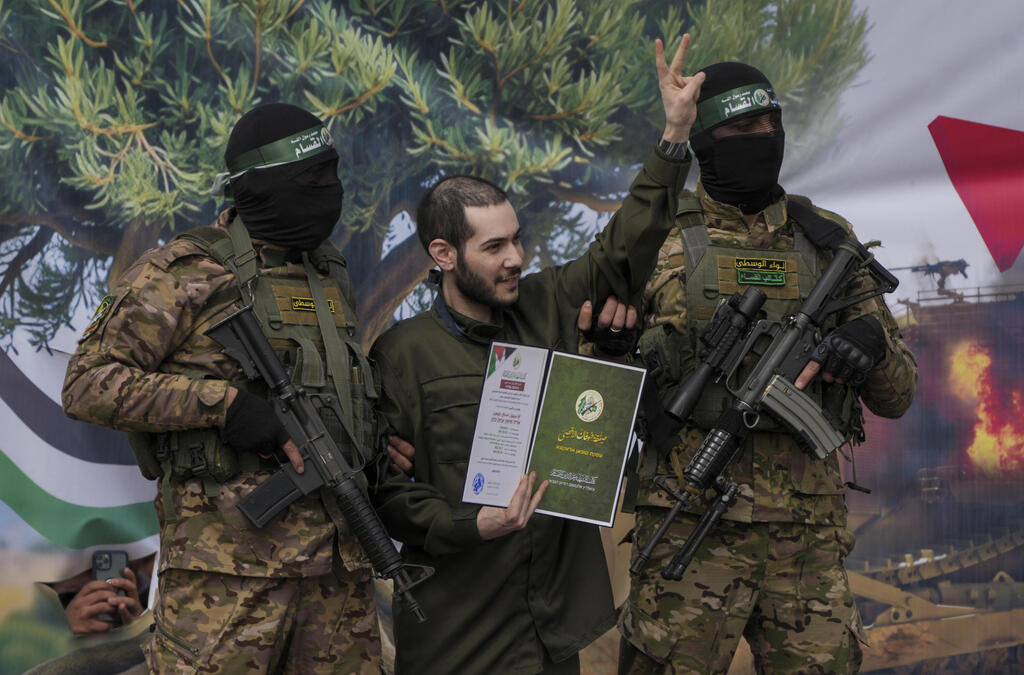

Hostage Eliya Cohen flashes a victory sign as he is released from his Hamas captors
(Photo: Ramadan Abed/Reuters)
But they were caught by a local Gazan who recognized them as Jews. “The man who’d been guarding us argued with him and eventually hid us in a grocery store. The bombing continued. We went back to the house and slept for two months on the rubble.”
Eventually, they were moved into the tunnels. “You know the terrorist hates you, but he can’t kill you yet—that’s the game. There were beatings, curses, constant harassment. To them, we were all soldiers. People talk about chains and injuries, and that’s hard—but the hunger was the worst.”
“In Gaza, everyone supports this,” he adds. “I saw it. Kids go to school in the morning with backpacks, and in the afternoon they carry weapons.”
'Yom Kippur every day'
“In the tunnel, the starvation was unbearable. Imagine going through Yom Kippur, not for a day—but for months. The pre-fast meal is a single pita, split four ways. Water was scarce too. The terrorists would taunt us: ‘When are you going home?’ ‘Gilad Shalit was here for five years—you’ve got time.’ They’d laugh. You’re in a constant mental battle, fighting minute by minute. You eat a piece of pita, and you’re already dreading tomorrow.”
There was physical violence too. “One time a terrorist got a call saying his family had been killed in a strike. He came in and trashed everything. Another terrible day was day 91. They told us the IDF was coming to rescue hostages, and if they reached us, they’d kill us. That day I got sick from eating garbage food and vomited. My legs were tied. I barely made it back from the toilet.
“Then there was an explosion. The tunnel shook. Pipes fell, the electricity went out. The terrorists, already wearing their vests, aimed their guns at us. They were just waiting for the order to kill. We looked at each other and said, ‘This might be the end.’ I told myself, ‘Okay, I’ve made it three months. Whatever happens now, happens.’ That was my mindset throughout.”
“I lost dozens of friends, including my best friend. But I told myself—my parents, my three sisters—they’re waiting for me. I knew that even if I didn’t know about it, people were fighting for me. If Ziv was alive, even with the smallest chance, she was probably burning down the White House or something. I held on for them, until the last drop of strength.”
A moment of victory
Cohen found a sense of victory, even in release. “I knew we were being filmed, so I held up a ‘V’ sign. The terrorists whistled, got angry, grabbed my arms—they were afraid I’d do something on stage. In that moment, they feared me—and I won.”
<< Get the Ynetnews app on your smartphone: Google Play: https://bit.ly/4eJ37pE | Apple App Store: https://bit.ly/3ZL7iNv >>
Despite everything, Cohen chooses to focus on the good. Even in captivity, he found reasons for hope. “It’s strange to say, but I got some gifts there—like quitting smoking. At first, they gave us a few cigarettes. I didn’t want them to have that power over me, so I stopped. It became a moment of change, of growth. I came out with a lot of insights.”
What kind of insights?
“When you’re alone for that long, you ask real questions. I asked myself: What have I done for others? That’s how I started volunteering, traveling with a group of children with cancer. I want to give. I have a lot to give.”
Abraham Atar, founder of the Lehosheet Yad foundation leading a trip to Los Angeles, says Cohen and Ziv are already making an impact. “Seeing Eliya, who survived 505 days in captivity, fly 15 hours to support kids battling cancer—it’s deeply moving. In this ‘Heroes for Heroes’ project, he and Ziv show that the human spirit, hope and faith are stronger than any pain. The children are inspired by them—and they draw strength from giving and being embraced in return.”
Is volunteering part of your healing?
“The return, the adjustment—it’s really hard. But yes, volunteering helps. I don’t feel sorry for myself. I didn’t do that there, so why here? My story has a good ending. For a year and a half, I imagined my life outside. I finally got to start over—so now what? How do I want to live? I realized how much I love the sea, so I started diving. I discovered an interest in psychology and business—maybe I’ll study that. The old Eliya never thought about these things. The Eliya of today just wants to live.”
Are you able to plan for the future?
“I dream of marrying Ziv and starting a family. I want to have children. But I know I face real challenges. I deal with things I wouldn’t wish on anyone. Beyond the physical and emotional struggles, I have deep anxiety about the future—especially financial. After what I’ve been through, when I see the gap between what the state provides and what’s actually needed, the fear grows.”
“There are days when financial stress hits me as hard as the memories. I don’t want to live in fear of how I’ll make it to the end of the month. I want to return to life, to normalcy—without dreading tomorrow. That’s why I launched a crowdfunding campaign—not out of weakness, but out of hope. So I can rebuild my life. So I can live without fear.”
To donate to Eliya Cohen’s recovery campaign – click here


